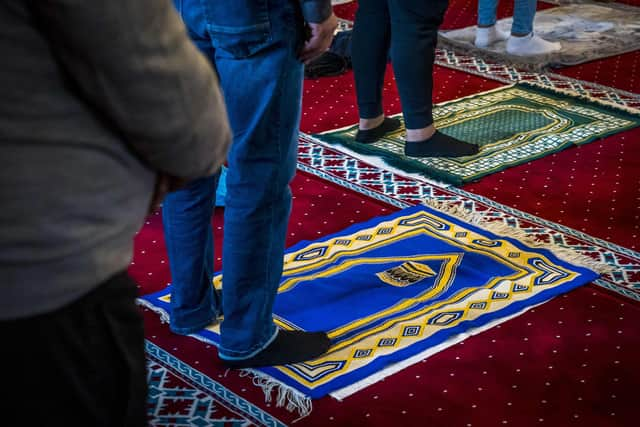Eid ul-Adha 2021: What is the Muslim festival of Eid ul-Adha? When it is and how it is celebrated in UK


After continued coronavirus restrictions across the UK led to the celebration of Eid ul-Fitr in much more low-key circumstances for the second year in a row, the excitement for Eid ul-Adha has come as restrictions are eased across the UK.
While England has now seen the lifting of all legal Covid-19 restrictions in what has been dubbed ‘Freedom Day’ for the nation, Scotland has moved into Level 0 –with rising positive coronavirus cases and the continued spread of the Delta variant still causing widespread concern.


Advertisement
Hide AdAdvertisement
Hide AdOften known as ‘big Eid’, the second of the two major muslim celebrations has now arrived in the UK and across the world, with Eid ul-Adha falling on the tenth day of the Islamic Lunar Calendar’s twelfth month, Dhu al-Hijjah.
The month is the most significant one in the Islamic Lunar Calendar, as the final month in the calendar and one which, as the ‘month of the pilgrimage’, includes the Hajj pilgrimage which sees Muslims from across the world journey to Saudi Arabia to worship at Mecca.
Here’s what you need to know about Eid ul-Adha this year.
When is Eid ul-Adha?
Eid ul-Adha, meaning the ‘Festival of Sacrifice’, takes place on the day after the Day of Arafah, which marks a final day of fasting before the festivities begin.
This year, the Day of Arafah fell yesterday on July 19 – with Eid ul-Adha commencing today (July 20) according to moon sightings in Saudi Arabia.
The Islamic Lunar Calendar shifts between 10 to 12 days earlier every year, as lunar sightings dictate when the Islamic months, and key events like the Hajj and Eid, take place.
Some muslims may celebrate the holiday tomorrow on July 21 if they are following lunar sightings in different countries, however.
For instance, many in Pakistan, the UK and Morocco will be celebrating Eid from July 21, following the lunar sightings in their own countries which placed the beginning of Dhu-al-Hijjah as on July 12 rather than July 11 as per Saudi Arabia’s observations.
The largest Islamic holiday is held to commemorate and celebrate willingness of Islamic prophet Ibrahim to sacrifice his son when commanded to by God, Allah.
Advertisement
Hide AdAdvertisement
Hide AdEid ul-Adha will last for three days and is held on the third day of the Hajj, the fifth pillar of Islam, which this year commences on July 18.
How is it different to Eid ul-Fitr?
While the summertime Islamic celebration of Eid ul-Adha takes place every year as a Festival of Sacrifice, Eid ul-Fitr takes place two months earlier as ‘the celebration of the breaking of the fast’.
It marks the three day celebration which comes at the end of the month-long fasting period of Ramadan, and in 2021 began on May 13 in the UK.
As per the shifting dates of the Islamic Lunar Calendar, the Eid ul-Fitr is held on the first day of the tenth month, Shawwal, in the Muslim calendar.
The two Eid holidays are celebrated in similar ways, but Eid ul-Fitr is viewed in Islam as the lesser of the two Eids and is often referred to as ‘small Eid’ – with Eid ul-Adha being considered the holiest of the two.
Those celebrating the festival in July have been warned to take care amid sweltering heatwaves worldwide, with climate crisis seeing floods, record-breaking temperatures and more in a number of countries across the globe.
How will it be celebrated across the UK?
The timely easing of restrictions on July 19 in the UK will mean that many will be able to enjoy celebrating the holiday both indoors and outdoors.
This will be a stark contrast to celebrations last year, which were suspended at the last minute as then-UK Health Secretary Matt Hancock announced new local lockdowns preventing Eid celebrations in English areas like Leicester, Manchester, West Yorkshire on July 30 – the night before Eid ul-Adha 2020 commenced on July 31.
Advertisement
Hide AdAdvertisement
Hide AdOne of the main rituals taking place on Eid ul-Adha is Qurbani, the sacrificing of either a sheep, goat, or cow by those who can afford to do so.
Under British law the animal must be killed in an official slaughterhouse.
The meat of the sacrificed animal is to be shared equally between friends, family and poorer citizens, with some Muslims also opting to donate to charity or less fortunate families in the local community as part of celebrations.
Muslims will also attend the Mosque for prayers, distribute gifts and travel to the homes of friends and family to continue the celebrations.
As with Eid ul-Fitr, the greeting for the major Muslim holiday is “Eid Mubarak” which roughly translates to “have a blessed Eid”.
